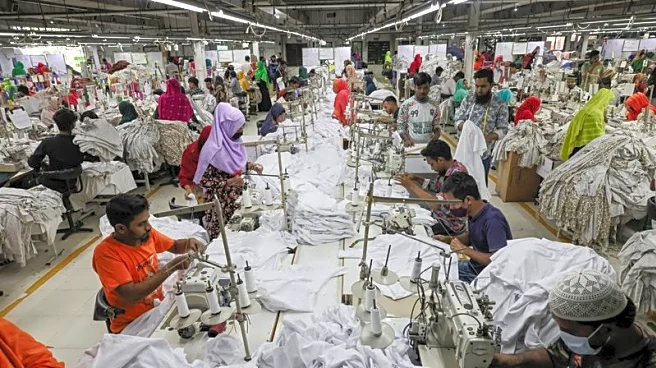What is the story about?
What's Happening?
The U.S. Labor Department has launched a new enforcement initiative, named 'Project Firewall,' aimed at ensuring compliance with the H-1B visa program. This initiative marks a significant step as the Labor Secretary, Lori Chavez-DeRemer, will personally certify the investigations, a first for the agency. The initiative is designed to safeguard the rights, wages, and job opportunities of American workers by holding employers accountable for any abuse of the H-1B visa process. Violations could result in monetary penalties, back wages, and exclusion from the visa program. This announcement coincides with President Trump's proclamation imposing a $100,000 application fee for the H-1B visa, which is predominantly used by the technology sector. The proclamation highlights concerns that the misuse of the H-1B system has led to the displacement of American workers.
Why It's Important?
The initiative underscores the government's commitment to protecting American workers from being displaced by foreign labor through the H-1B visa program. By enforcing stricter compliance measures, the Labor Department aims to ensure that highly skilled jobs are prioritized for Americans. This move could have significant implications for industries reliant on H-1B visas, particularly the technology sector, which may face increased costs and scrutiny. Employers who rely on H-1B visas must now navigate a more rigorous compliance landscape, potentially affecting their hiring practices and operational costs. The initiative reflects broader policy shifts under the Trump administration, emphasizing domestic employment and reducing reliance on foreign labor.
What's Next?
Employers utilizing the H-1B visa program should prepare for increased scrutiny and potential investigations as the Labor Department implements 'Project Firewall.' Companies may need to reassess their compliance strategies to avoid penalties and ensure adherence to the new regulations. The technology sector, in particular, may experience changes in workforce dynamics as the initiative progresses. Additionally, the $100,000 application fee could deter some companies from pursuing H-1B visas, leading to shifts in hiring practices. Stakeholders, including industry leaders and policymakers, will likely monitor the impact of these changes on the labor market and the economy.
Beyond the Headlines
The initiative may prompt broader discussions on immigration policy and labor rights in the U.S. The focus on protecting American workers could influence future legislative actions and public sentiment regarding foreign labor. Ethical considerations around fair labor practices and the balance between domestic and foreign employment may also arise. Long-term, this could lead to shifts in how companies approach talent acquisition and workforce planning, potentially affecting the U.S.'s competitive edge in global markets.


















